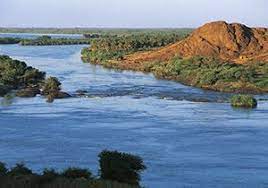The River Nile of Africa: A Lifeline of History, Culture, and Sustainability

The River Nile is one of the longest and most famous rivers in the world. It is an essential lifeline for Africa, flowing through several countries and sustaining ancient civilizations. The Nile has played a significant role in shaping the region’s history, culture, and environmental dynamics.
The River Nile begins at Lake Victoria in East Africa, where its two main tributaries, the White Nile and the Blue Nile, come together. The White Nile originates from Lake Victoria, while the Blue Nile starts at Lake Tana in Ethiopia. These two tributaries meet at Khartoum, Sudan, and form the Nile River, which flows northward through Egypt before finally emptying into the Mediterranean Sea.
The Nile has great historical and cultural importance, particularly in Egypt, where it played a crucial role in the rise of ancient civilizations. The Nile Valley was the birthplace of the ancient Egyptian civilization, which thrived along the river’s fertile banks thanks to its annual floods that deposited nutrient-rich silt. The Nile was revered as a deity (Hapi) by the ancient Egyptians, representing life, fertility, and prosperity.
The Nile has a significant impact on agriculture and irrigation. The yearly floods, caused by seasonal rains in the Ethiopian Highlands, provide nutrients to the soil, making the Nile Delta and Nile Valley highly fertile for agriculture. The ancient Egyptians utilized advanced irrigation techniques, such as basin irrigation and shaduf systems, to maximize crop yields and maintain their civilization.
The Nile river remains an essential resource for agriculture in modern times, providing water for crops such as cotton, wheat, and sugarcane. The construction of the Aswan High Dam in Egypt has played a significant role in regulating the Nile’s flow, controlling flooding, generating hydroelectric power, and supporting irrigation projects. However, the construction of dams and water management practices have also raised concerns about environmental impacts, water scarcity, and downstream effects on ecosystems and communities.
The sustainable management of the River Nile is crucial for its long-term health and productivity. To achieve this goal, initiatives that focus on water conservation, watershed protection, efficient irrigation practices, and equitable water-sharing agreements among the riparian countries are essential. Balancing the needs of agriculture, energy production, navigation, and ecological preservation is a complex but necessary endeavor to ensure the Nile’s sustainability.
The Nile is not just a source of practical benefits, but also a place of great beauty and historical significance, making it a top destination for tourists and those interested in cultural exploration. The river offers a range of experiences, from cruises that let you take in the scenery to visits to ancient temples and monuments. Along the riverbanks, visitors can also immerse themselves in local cultures, which in turn helps promote cross-cultural exchange. All of these attractions together make the Nile a significant contributor to Egypt’s tourism industry.
The River Nile in Africa has been a symbol of resilience, prosperity and cultural richness for centuries. From ancient civilizations to modern developments, the Nile has played a vital role in shaping the continent’s history and supporting its growth. However, to ensure its sustainability, Nile Basin countries must collaborate to address challenges such as water scarcity, environmental degradation and socio-economic disparities. By working together to safeguard the Nile’s resources and heritage, Africa can continue to benefit from this iconic river for generations to come.



